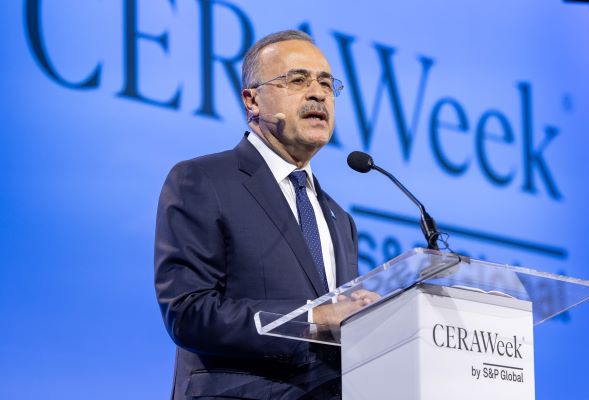The greatest transition fiction was that conventional energy could be almost entirely replaced, virtually overnight…

Amin H. Nasser, President & CEO, Aramco
Aramco President & CEO Amin H. Nasser highlighted the risks of current energy transition planning, and stressed the urgent requirement for a new global energy model.
In a keynote speech at CERAWeek 2025 in Houston, Texas, Nasser pointed to the expected need for a yearly estimated additional $6 to 8 trillion to fund global climate action, and warned that a failure to change the current approach would constitute a “fast track to dystopia.”
On current transition planning, Nasser said: “The greatest transition fiction was that conventional energy could be almost entirely replaced, virtually overnight… Hydrocarbons still provide over 80 percent of primary energy in the US, almost 90 percent in China, and even in the EU it is more than 70 percent… New sources add to the energy mix and complement existing sources. They do not replace them... New sources cannot even meet the growth in demand, while the proven sources needed to fill the gap are demonized and discarded. It is a fast track to dystopia, not utopia.”
On the need for a new global energy model, he said: “First, all sources must play a growing role in meeting rising energy demand in a balanced, integrated manner. Certainly, that includes new and alternative energy sources. But they will complement conventional energy, not replace it in any meaningful way. So we need investments in all sources… And to further free up such investments globally, we need extensive de-regulation and greater incentives for financial institutions to provide unbiased financing. Second, the model must genuinely serve the needs of developed and developing nations alike, as originally promised, especially when it comes to technology. Third, and crucially, this has to be about delivering real results.”
On the importance of emissions reductions, he said: “Let me be absolutely clear: this does not mean stepping back from our global climate ambitions. Reducing greenhouse gas emissions must still get the highest possible priority. That means prioritizing technologies that drive efficiency, lower energy use, and further reduce greenhouse gas emissions from conventional energy — and AI will clearly be a game-changing enabler. But the future of energy is not only about sustainability. Security and affordability must share the stage. With all energy sources working in harmony as one team, delivering real results.”
Subscribe to our newsletter & stay updated.